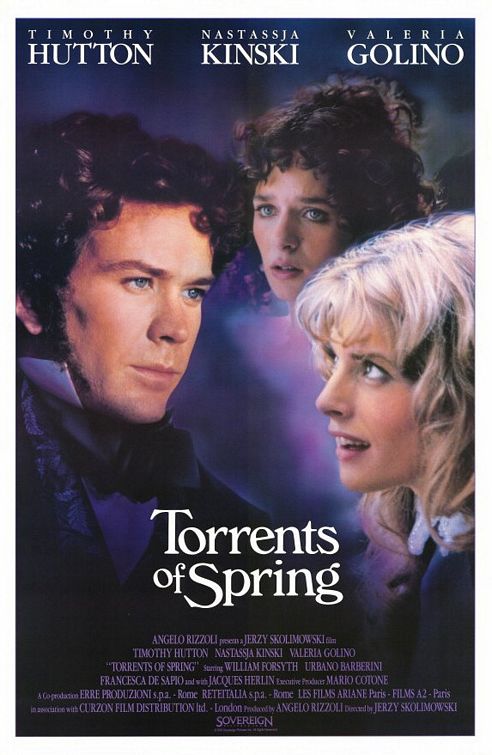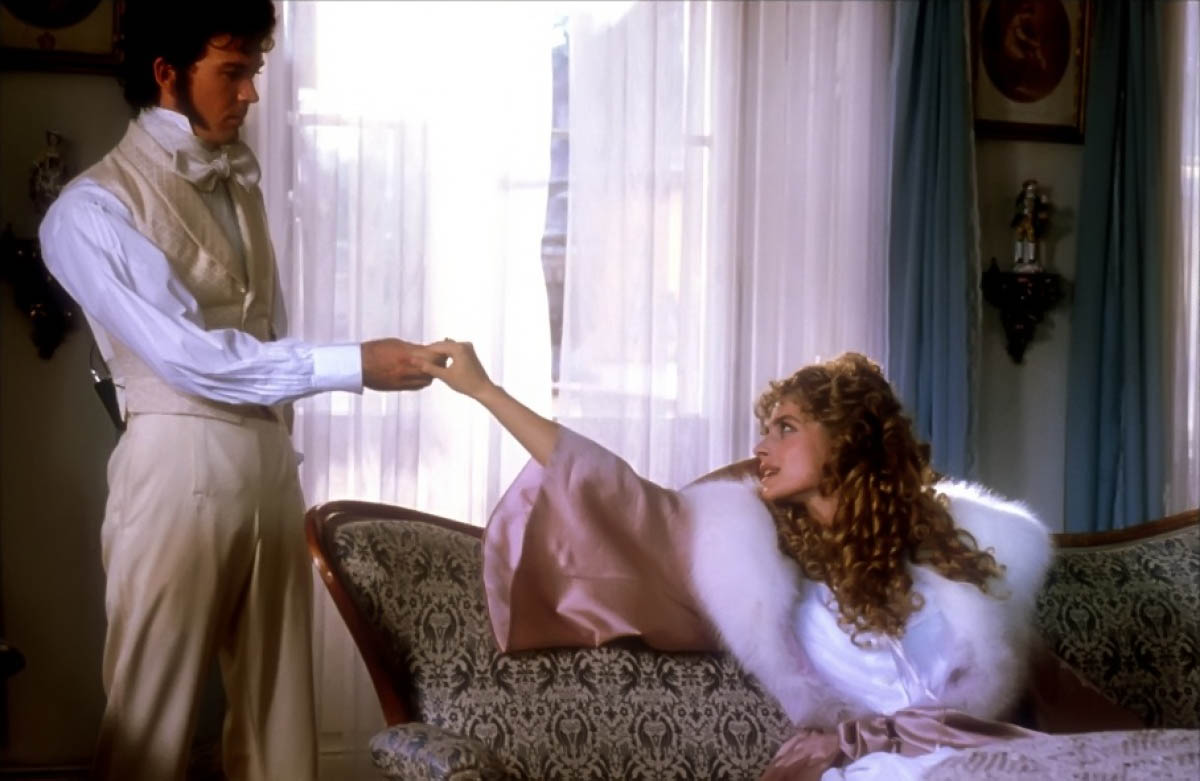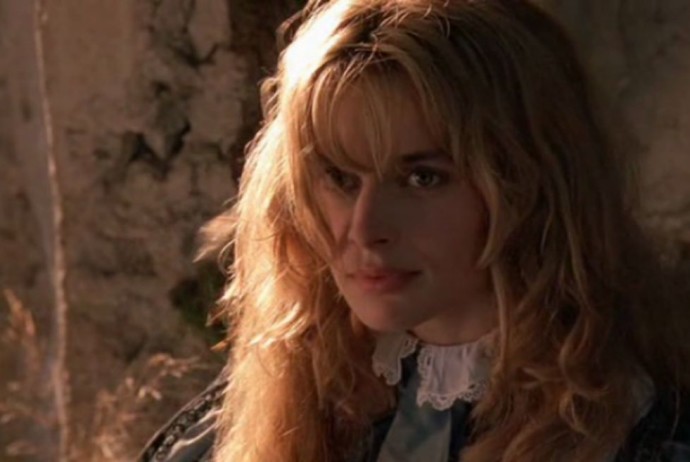Dir: Jerzy Skolimowski
Star: Timothy Hutton. Nastassja Kinski, Valeria Golino, William Forsythe
“You talk about freedom, but it’s only freedom for yourself. You destroy and you kill everything, everything around you. People only exist for your pleasure and your amusement, and you enjoy the torture and the ridicule. It is monstrous what you’re doing!”
— Dimitri Sanin to Maria Nikolaevna Polozov
After the awfulness which was Magdalene, this was like a lemon sorbet on my cinematic palate. It is still something of a Euro-pudding, with token Hollywood actor Hutton playing Russian land baron, Dimitri Sanin. Yet it works, in part because Kinski gets to play an utter c… Er, let’s just say, she’s not very nice, probably for the first time in her cinematic career, and seems to relish the opportunity. Her character, Maria, like Dimitri, is also Russian and upper-class, but appears to have been twisted by her upbringing. She was born into a family of serfs, and only recognized by her father, the local land-owner, on his death-bed, when she was 13. Perhaps that’s why she resents the “genuinely” aristocratic Sanin, and sets about single-mindedly destroying his happiness.
 In particular, she aims at his relationship with Gemma Rosselli (Golino), who works in a pastry-shop in the German town Mainz, which Sanin is visiting. He saves the live of her brother, is invited to dinner, and the two fall in love. Which is unfortunate, since she is already engaged. However, when Dmitri shows himself willing to fight a duel to protect Gemma’s honor (even though the incident was actually provoked by Maria), she breaks the relationship off, and Dmitri begins preparing to sell his Russian estates and move permanently to Mainz. He bumps into an old friend, Prince Ippolito Polozov (Forsythe), who says his wife may be interested in purchasing Dmitri’s land – but this is merely a ruse for Maria to get up close and personal with our hero. She reels Dimiri in, seduces him, then invites Gemma over, for what rapidly becomes a credible candidate for Most Uncomfortable Dinner Party Ever.
In particular, she aims at his relationship with Gemma Rosselli (Golino), who works in a pastry-shop in the German town Mainz, which Sanin is visiting. He saves the live of her brother, is invited to dinner, and the two fall in love. Which is unfortunate, since she is already engaged. However, when Dmitri shows himself willing to fight a duel to protect Gemma’s honor (even though the incident was actually provoked by Maria), she breaks the relationship off, and Dmitri begins preparing to sell his Russian estates and move permanently to Mainz. He bumps into an old friend, Prince Ippolito Polozov (Forsythe), who says his wife may be interested in purchasing Dmitri’s land – but this is merely a ruse for Maria to get up close and personal with our hero. She reels Dimiri in, seduces him, then invites Gemma over, for what rapidly becomes a credible candidate for Most Uncomfortable Dinner Party Ever.
It’s a beautifully shot work, right from the opening scene of a coach on a ferry, and much credit to cinematographer Dante Spinotti, who would go on to be Oscar nominated twice, for his work on LA Confidential and The Insider. The beauty on display – not least Kinski, who is positively luminescent, particularly in one scene, which we’ll get to later – is in sharp contrast to the moral corruption and decay on display here. It’s based on a largely auto-biographical work by Ivan Turgenev, best known for Fathers and Sons and doesn’t make for a cheerful film. Admittedly, merely knowing it’s based on a 19th-century Russian novel, probably is enough for a reasonably safe bet that you’ll be watching people making poor life choices, with bad things happening to them, and those they love, as a result.
Skolimowski was a contemporary of Roman Polanski – he wrote dialogue for Knife in the Water. While he has never had anything like the commercial success, I guess neither has Polanski acted in a year’s top-grossing movie – Skolimowski played Georgi Luchkov in The Avengers. He also appeared in Eastern Promises and Mars Attacks!; here, he has a camei as a balloonist at the local fair. As a director, it seems this film fits right into his cinematic wheel-house. Glenn Heath wrote, “Skolimowksi’s films have always been about cornering psychologically fractured men, blurring their rationale, and sending them to hell. The reasons behind their continued suffering may vary, yet the end result always succumbs to tragedy,” and that’s what we have here. Dimitri steals Gemma’s heart away from her fiance. Then he discovers what it’s like to be on the receiving end, as Maria sweeps in and takes possession of his heart – not because she loves him, mostly because it amuses her.
There’s more than a hint of Dangerous Liaisons in her manipulative scheming, though she’s much more “hands-on” than Glenn Close – I kinda want to jump ahead and watch the French version of that, in which Kinski appeared. However, Catherine Deneuve is the uber-bitch, with Kinski playing the Michelle Pfeiffer role, which is probably not nearly as much fun, let’s be honest. The best sequence has Maria and Dimitri going on a horse-ride, which leads to them fortuitously being invited to a gypsy wedding. It’s incredible eye-candy, and Kinski looks absolutely stunning: you know Dimitri’s fate is sealed, especially considering how we have already seen how easily he gave his heart to Gemma. Hell, I’ve been happily married for over a decade, and it would take me at least several seconds before deciding to stay faithful. That’s my story, and I’m sticking to it. Of course, this is a 19th-century Russian novel, as mentioned, so we know Dimitri will make no such sensible decision.

My main problem is with the ending. After the Most Uncomfortable Dinner Party Ever, things gallop to the end credits in a manner that feels incredibly rushed. There’s a very strange epilogue, set in Venice, with Hutton made up as an old man, roaming the streets in a harlequin costume, looking for Maria. Maybe it’s a dream – or a nightmare – as much as it is a memory. Then we get a quick recap, telling us the fates of the lead characters, which I guess is what passes for a moral, and we end where we began, with the coach on the ferry. If you want a summary of the relentlessly tragic approach here – not that it’s a bad thing, I should stress – you can probably do no better than the final voice-over: “Looking across life’s ocean, Sanin saw himself in a small boat, staring down below at hideous monsters like enormous fish. These were life’s hazards: grief, madness, poverty, blindness. Rising higher, one of the monsters becomes so horribly distinct that the next moment, the boat will be overturned. But it slowly sinks to the bottom, where it waits the appointed hour.”
Yeah. It’s like that.
